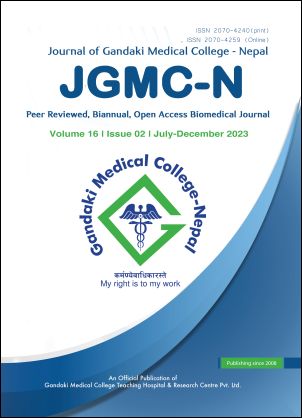Clinical educators of the medical colleges of South Asia need to be trained for educating clinical reasoning skills to medical students
DOI:
https://doi.org/10.3126/jgmcn.v16i2.60333Keywords:
Clinical learning, Medical education, Virtual RealityAbstract
Clinical reasoning is the process of reasoning to decide for managing the patient using data and applying medical knowledge and experience. Clinical reasoning skills are essential skills for the novice learner of medical education to learn the process of clinical diagnosis, thereby providing safe and effectual health care. These skills learning help clinicians arrive at a diagnosis and prevent making diagnostic errors which are reported to occur in five to 15% of cases. Poor clinical reasoning leads to a diagnostic error which may jeopardize the patient’s safety.
The clinical reasoning skills are not generally explicitly imparted to the learners especially during their undergraduate learning period even though these may be documented in the curriculum of medical undergraduate study. The key elements in the clinical reasoning process are the patients’ story, data acquisition, problem representation, hypothesis generation, search and selection of illness script, differential diagnosis, and a leading diagnosis.
Clinical reasoning is a complex process, difficult to teach learners and assess their skills, consumes clinical medical educators’ time, and requires resources for teaching and learning. There must be educational strategies both at the undergraduate and postgraduate levels to promote diagnostic reasoning skills; for this, clinical medical educators must be acquainted/trained in how to convey the reasoning approaches to beginners. The clinical medical educator has to a play dual role; provide quality care to the patients, teach clinical reasoning skills to the learners, and assess their skills to make them independent decision-makers and problem solvers in clinical settings.
Clinical reasoning skills are among the core competencies to be learned by medical learners to become competent clinicians. The clinical competence of the clinician cannot be superseded by the advancement of technology and evidence-based medicine. All these three need to be integrated to minimize the errors in diagnosis. Clinical educators must unequivocally nurture and enhance the capacity of learners to include and integrate both analytical and non-analytical clinical reasoning strategies into their approach to arrive at diagnosis. The clinical medical educator must identify the learners’ approach to clinical reasoning and enable them to follow the right approaches towards clinical reasoning. Clinical reasoning skills are better learned/imparted during clinical encounters and deliberate practice enriches learning of these skills.
Enhancement of clinical reasoning skills learning can be achieved through deliberate practice. The clinical medical educator may organize and supervise the simulation-based deliberate practice sessions for the learners to boost their clinical reasoning skills. For the deliberate practice of clinical reasoning skills, The New England Journal of Medicine (NEJM) has developed an application NEJM Healer, a screen-based interactive patient encounter (Virtual Bedside Encounter) through which learners are involved in each element of clinical reasoning process. Virtual Reality (VR) is also gaining popularity in educating the medical students and has been demonstrated to be beneficial in enhancing students’ comprehension and memory as well as in the development of transferable skills like surgical methods. The medical schools in South Asian countries need to reiterate the development/enhancement of clinical reasoning skills of both medical undergraduate and postgraduate learners. To achieve this objective, medical colleges must regularly organize training for clinical medical educators to facilitate students’ learning in reasoning skills, and for assessing their skills, and provide feedback to the learners. The institutes should also invest in infrastructure to pursue the use of modern technologies like VR, skills labs, etc. to attain this objective.
Downloads
Downloads
Published
How to Cite
Issue
Section
License
Copyright (c) 2023 Rano Mal Piryani, Suneel Piryani, Nuwadatta Subedi

This work is licensed under a Creative Commons Attribution-NonCommercial 4.0 International License.
This license allows reusers to distribute, remix, adapt, and build upon the material in any medium or format for noncommercial purposes only, and only so long as attribution is given to the creator.




